
The very first telephone in South Africa entered Cape Town around 1878. Apparently, a watchmaker named Adolph Boettger imported it from Germany, and it was first used in the post office. That phone was even more primitive than the model in this image, which was called a “candlestick telephone.”
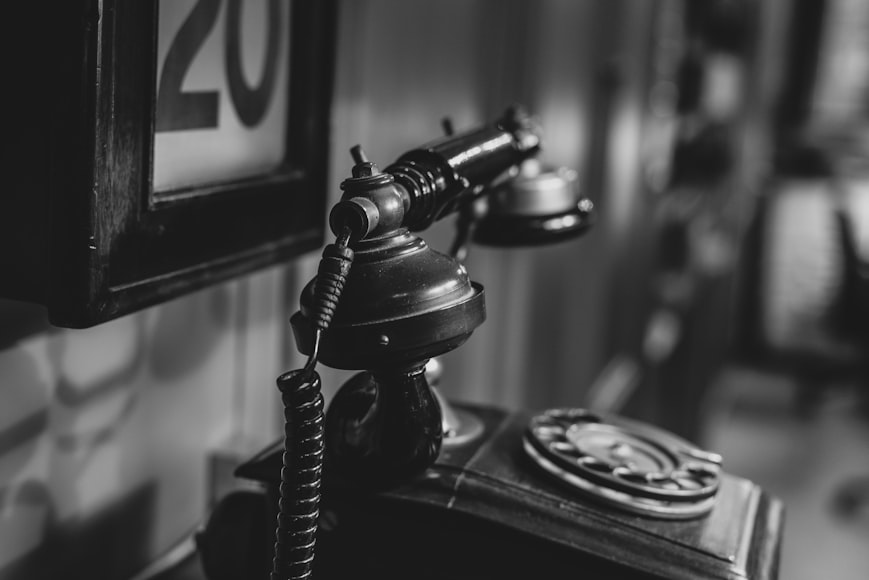
Kandelaar telefone is vervaardig in die vroeë negentiende eeu. / “Candlestick telephones were manufactured in the early nineteenth century.”
Like the rest of the world, South Africa hasn’t looked back since. Cell phones arrived on the scene in 1994, and just like in most other countries, these devices basically took over the telecommunication industry. But while there has never been a more critical time to pick up Afrikaans phone phrases, you might be doubtful as to their relevance.
In fact, many members of the previous generation wouldn’t even be able to tell you what the item in the photo above is, let alone what it was used for! Since the advent of smartphones, terms like “push button telephone” have become basically obsolete, while “iOS” and “Android” are commonplace. Well, that’s technological progress for you.
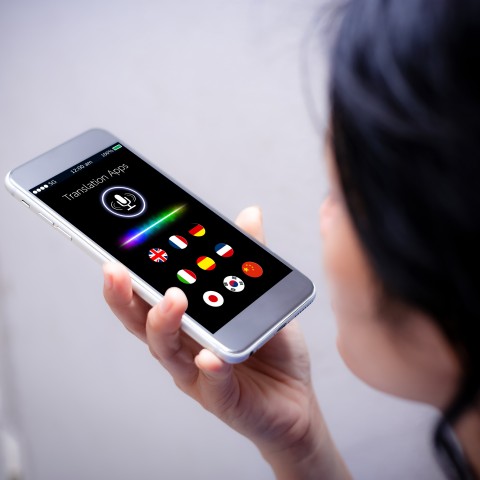
Goeie foonetiket is belangrik. / “Good phone etiquette is important.”
That said, dial-button phones are still in use (though mainly for business purposes). And one thing that has not disappeared or changed is phone etiquette. No matter which device is used, the basics of how to address someone over the phone have remained the same.
Therefore, we’ve compiled a list of practical Afrikaans phone call phrases in English and categorized them for your convenience! Also, whether you’re taking or making a call, you still need to greet the person on the other side. So quickly learn all about that in this article titled How to Say “Hello” in Afrikaans Like a Native Speaker! or master it using this easy lesson.
 Table of Contents
Table of Contents
- Taking a Call
- Making a Call and Starting a Conversation
- The Rest of the Conversation…
- Example Dialogues
- AfrikaansPod101 for the Best Afrikaans Phone Phrases & Much More!
1. Taking a Call
The type of call you’re receiving will determine the Afrikaans phone phrases you’re going to use. Below are examples of how to take a formal call, a business call, and a personal call.
1.1 Formal & Business
For business purposes, if you have a formal relationship with the caller or if you don’t know who’s calling, you’ll answer the phone in a relatively formal, polite way. If you don’t want to identify yourself when taking a call, it’s okay not to in South Africa.
Note that the following greetings are either neutral or time-specific.
These short, common greetings for receiving a call are most appropriate if you don’t know the caller, you don’t want to identify yourself, and/or you don’t wish to encourage conversation. Preferably, don’t bark out this greeting when you answer! Keeping your tone friendly and polite will help you avoid embarrassment—you never know who could be on the other side of the phone!
“Hello?” / “Good day?” / “Good morning?” / “Good afternoon?” / “Good evening?” |
Next are more respectful, formal greetings to use when you don’t know the caller.
“Good afternoon. Who’s calling, please?” → Goeienaand, dis Magda wat praat? “Good evening, it’s Magda speaking?” → Goeiemore, Magda hier? “Good morning, Magda here?” |
You would use the following when you answer the phone at work. Afrikaans phone call phrases for business contexts tend to follow the same format, said in a polite tone. When you’re answering the call as a receptionist, personal assistant, shop attendant, etc., you would:
“Good day, Brink, De Bruin and Partners, Mariëtta speaking.” → Goeiemore, Dokter Camilla De Beer se spreekkamers. Kan ek help? “Good morning, Doctor Camilla De Beer’s rooms. May I help you?” |
This is a polite, formal phrase to use when you know the caller’s identity.
(“Good afternoon, Doctor De Beer, Thijs speaking.”) |
Note: All of these phrases are statements, but you would use them with a questioning tone. This invites the caller to identify themselves and/or return your greeting and state their business.

Goeiemiddag, Dokter De Beer, dis Thijs wat praat. / “Good afternoon, Doctor De Beer, Thijs speaking.”
1.2 Informal
Most of the time, if you know the caller and you’re not taking a business call, it’s customary to answer your phone informally.
You would say something like this:
→ Goeiedag! (“Good day!”) → Haai daar! (“Hi there!”) → Haai jy! (“Hey you!”) → Haai Magda! What’s up?! (“Hi Magda! What’s up?!”) South Africa is very Anglicized and Afrikaans speakers often mix their language with English slang or popular phrases from one of the other national languages. As you can imagine, this one is a very informal, casual greeting. → More Tannie Kotie. (“Morning, Auntie Kotie.”) Note that Goeiemore can be contracted to More, similar to “Good morning” vs. “Morning” in English. Oom and Tannie (“Uncle” and “Auntie”) are the forms of address Afrikaners use for much older folks, as well as older relatives. This is a sign of respect. However, when meeting someone for the first time, you’ll often be invited to ditch the formalities and call them by their first name. That said, it’s always best to wait for this invitation, because over-familiarity does not sit well with the older Afrikaners (especially those from rural communities). |
After using any one of these greetings, it’s okay to wait for the other person to introduce themselves (if you don’t know their identity, of course), to return a greeting, and/or to start a conversation. Afrikaners often love a good chat!

More Tannie Kotie. / “Morning, Auntie Kotie.”
2. Making a Call and Starting a Conversation
But what if you’re the caller? Then different rules apply.
2.1 Formal & Business
When you’re making a business call or have a formal relationship with the person you’re calling, you would reply to the previously listed formal phrases like this:
“Good day, Mariëtta, Thijs here. Are things going well for you?” → Goeiemiddag, ___. My naam is ___ en ek wil graag met ___ praat, asseblief? “Good afternoon, ___. My name is ___ and I would like to speak with ___, please?” → Goeiemore Meneer/Mevrou/Me. Hoe gaan dit met u? “Good morning, Sir/Madam. How are you doing?” Note: You could say “Hello” instead of using a time-based greeting. This is generally acceptable, unless:
Also note the use of the formal u pronoun, which is plural for “you.” That said, if you’re making a formal call to someone you know is younger than you, it would be okay to simply use jou instead. |
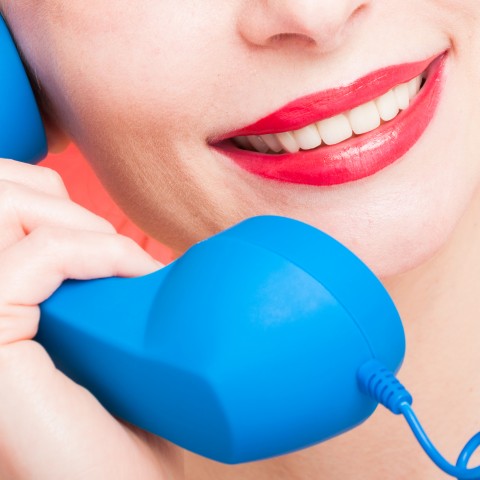
Goeiemore Meneer. Hoe gaan dit met u? / “Good morning, Sir. How are you doing?”
2.2 Informal
When you’re making a phone call in Afrikaans to someone you’re close with or to a business associate you know quite well, the appropriate informal response would sound like this:
- → Hello, my kind! Hoe gaan dit?!
“Hello, my child! How are you?”
My kind is a common way for parents and older relatives to address a younger loved one. It’s almost a term of endearment.
- → Haai jy! How goes?
“Hey you! How goes?”
“How goes” is English slang similar to “What’s up?!”
- → Hey! Hoe lyk dinge?!
“Hey! How are things?!”
Hoe lyk dinge?! and “How goes?” are two expressions that serve as super-casual greetings to which no reply is expected. They’re mainly (but not exclusively) used by Afrikaner men—think meeting your mates at a bar to watch a lively rugby match together! You can reply if you want to, but really, these are just the noises people make to acknowledge someone’s presence and indicate pleasure at seeing them.
- → Hello ___! Hoe gaan dit daar met julle?
“Hello ___! How is everything on your [plural] side?”
- → More Magdatjie! Hoe gaan dit met jou, my skat?
Lit. “Morning little Magda! How are you doing, my treasure?”
Many Afrikaners love using diminutives to show affection, but it’s reserved only for people the speaker knows well.

Hello ___! Hoe gaan dit daar met julle? / “Hi ___! How is everything on your [plural form] side?”
3. The Rest of the Conversation…
So you’ve taken or made the call and you both know who you’re speaking to—now what? Here are the appropriate Afrikaans phone conversation phrases with which to continue.
First, you’re going to reply to any query after your well-being. Like in English, this is more of a social habit to ease conversation rather than a sincere question—unless you and the speaker are close, of course. In such a case, it would be acceptable (and even expected) for you to be honest in your reply. However, you would usually reply like this, which is perfectly fine for both formal and informal conversations:
|
Informal alternatives that are fit for use when you know the caller or respondent relatively well:
|
Now you need to state your reason for the call.
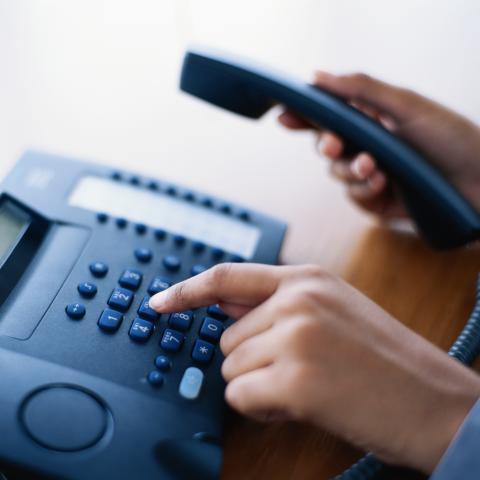
Gebruik toepaslike Afrikaanse foonfrases om ‘n goeie foon gesprek te verseker. / “Use appropriate Afrikaans phone phrases to assure a good phone conversation.”
3.1 Formal & Business
You have already encountered one reply to a business call where the caller stated their business. If the person who took the call doesn’t know you, you’ll always introduce yourself first. Depending on the reason for the call, you can either state your first name and surname, or only your first name.
More Formal: My naam is ___. (“My name is ___.”) / Dis ___ wat praat. (“This is ___ speaking.”)
Informal: ___ hier. (“___ here.”)
Next, you can state the reason for your call with one of these phrases:
“I received a message that I should call you?” → Ek wil graag bespreek vir… “I would like to make a booking for…” → Ek wil ons bespreking bevestig, asseblief. “I would like to confirm our reservation, please.” → Ek wil graag ‘n afspraak maak met / vir ___, asseblief. “I would like to make an appointment with / for ___, please.” → Ek wil ‘n bespreking / afspraak vir more kanselleer, asseblief. “I want to cancel a booking / appointment for tomorrow, please.” Note: In South Africa, it’s customary to cancel a booking with a service provider at least 12 to 24 hours in advance. Some, not all, will charge you the appointment amount (or a portion of it) if the cancellation is late, or if you don’t pitch without cancelling. This is not the case with restaurants, except fine diners which often charge a non-refundable booking fee or deposit.
“Is Doctor De Beer in, please? I have an urgent query.” → Ek wil met iemand praat oor ___, asseblief? “I need to speak to someone about ___, please?” |

Hou aan vir dokter De Beer, asseblief. / “Please hold for Doctor De Beer.”
Once the purpose of the call is clear, any one of the following response phrases would be appropriate:
“Please hold for Doctor De Beer.” → Hou aan, asseblief, ek kyk of sy beskikbaar is. “Hold on, please, I will see if she’s available.” → Dankie dat u aangehou het. Dokter De Beer is besig met ‘n pasiënt. Kan sy u later terugskakel? “Thank you for holding. Doctor De Beer is busy with a patient. Can she call you back a bit later?” Note: The formal pronoun u (“you”) is customary when you’re addressing clients, unless the company’s business style is informal or you know the caller well. All the pronouns in the example sentences can be replaced with others, of course. Learn all about Afrikaans pronouns in this blog post!
“How can I help?” → Dankie dat jy teruggebel het. Ek skakel jou deur na ___ toe. “Thank you for calling back. I am putting you through to ___.” → Hou aan, asseblief.Approximate: “Stay on the line, please.” → Wil jy ‘n boodskap laat? “Would you like to leave a message?” |
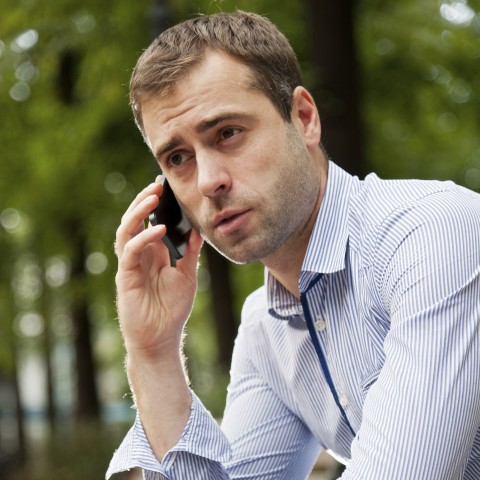
Hoe kan ek help? / “How can I help?”
3.2 Informal
Informal replies following the initial greetings and introductions usually lead to a casual conversation, since you’re most likely talking to a friend or someone you know well.
For the purposes of this article, we haven’t included many informal Afrikaans phone phrases for a complete conversation—the possibilities are too numerous! However, see the example dialogue below.
Here are a few popular informal phrases you could use when you’re the caller:
“May I speak with ___, please?” → Sal jy seblief vir haar sê ek het gebel? “Will you please tell her I called?” → Mag ek ‘n boodskap los, seblief? “May I leave a message, please?” → Het jy planne vir ___? “Do you have plans for ___?” → Is jy besig ___? “Are you busy ___? “This can mean “Are you busy?” or “Will you be busy on / at ___,” depending on the context. → Wat doen jy ___? This can mean “What are you doing?” or “What will you be doing [on] ___,” depending on the context. → Kom ons gaan eet pizza. “Let’s go have pizza.” → Tel jou sesuur op? “Pick you up at six o’clock?” → Goed dan. Sien jou netnou! “All good. See you soon!” Note: Seblief is a contraction of asseblief, which means “please.” Also, some of the incomplete questions can be used as they are, but, just like in English, they will mean something slightly different. Or, they can be completed with the time, a date, or a day of the week. Here’s also an article on authentic South African foods that might come in handy when making plans! |

Tel jou sesuur op? / “Pick you up at six o’clock?”
Next are a few popular phrases to consider using if you’ve received the call:
“Hold the line, I’ll call her.” → Jammer, ___ is nie hier nie. Wil jy ‘n boodskap los? “Sorry, ___ isn’t here. Would you like to leave a message?” → ___ vra dat jy asseblief oor ‘n uur weer sal bel. “___ has asked you to please call again in an hour.” → Ek is nie besig nie. Wil jy iets saam doen?Approximate: “I’m not busy. Would you like to get together?” → Ek is los ___. “I’m free [on] ___. “ → Ek is los om ___. “I am free at ___.” → Pizza klink lekker. “Pizza sounds nice.” → Ek kan ___ maak. “I can make ___.” → ___ is goed. “___ is good.” → Sien jou later! “See you later!” → Jammer, ek is besig ___. “Sorry, I am busy [on] ___.” |
4. Example Dialogues
Now, let’s apply what we’ve learned! Below are two examples of what a call in Afrikaans might sound like depending on the context.
4.1 Business / Formal Dialogue

Goeie foonetiket is net so belangrik soos ‘n goeie “bedside manner” in enige mediese praktyk. / “Good phone etiquette is as important as a good bedside manner in any medical practice.”
Afrikaans phone call phrases in English need not flummox you! Take a look at this dialogue.
Thijs has to speak to his GP, Doctor Camilla De Beer, about a prescription. He has already been this doctor’s patient for years and knows her receptionist, Nelia. This is how he conducts the call: Dr. De Beer’s Receptionist Nelia: Goeiemore, Dokter Camilla de Beer se spreekkamer, Nelia wat praat? “Good morning, Doctor Camilla de Beer’s Rooms, Nelia speaking?” Thijs: Goeie more, Nelia. Dis Thijs de Vriese wat praat. Hoe gaan dit? “Good morning, Nelia. It’s Thijs de Vriese speaking. How are you doing?” Nelia: Goeiemore, Thijs. Dit gaan goed met my, dankie, en self? “Good morning, Thijs. I am doing well, thanks, and you?” Thijs: Dit gaan goed met my ook, dankie. “I am also doing well, thanks.” Nelia: Hoe kan ek help, Thijs? “How can I help, Thijs?” Thijs: Is Dokter De Beer beskikbaar om te praat, asseblief? Ek het ‘n dringende navraag. “Is Doctor De Beer available to talk, please? I have an urgent query.” Nelia: Hou aan, asseblief. Ek sal kyk of sy beskikbaar is. “Hold the line, please. I will see if she’s available.” Thijs: Dankie, Nelia. “Thank you, Nelia.” Nelia: Dokter is besig met ‘n pasiënt. Kan ek ‘n boodskap neem of vra dat sy jou terugskakel? “The doctor is busy with a patient. May I take a message or ask her to return your call?” Thijs: Ja, laat sy my terugbel asseblief, Nelia. Ek sal dit waardeer. Baie dankie. “Yes, ask her to call me back please, Nelia. I will appreciate that. Thank you very much.” Nelia: Dis ‘n plesier. Totsiens, Thijs. “It’s a pleasure. Goodbye, Thijs.” Thijs: Totsiens. “Goodbye.” |
4.2 Informal

Is jy besig vanaand? / “Are you busy tonight?”
Morgan has not seen her friend, Sandy, for a while and misses her. This is how Morgan would go about organizing a get-together over the phone. Remember, Morgan’s caller ID is showing on Sandy’s phone. Sandy: Haai jy! How goes?! “Hey you! How goes?!” Morgan: Kan nie kla nie, en self? “Can’t complain, and you?” Sandy: Great! Dieselfde hier, dankie. “Great! Same here, thank you.” Morgan: Is jy besig vanaand? “Are you busy tonight?” Sandy: Ek is nie besig nie. Wil jy iets doen? “I’m not busy. Would you like to meet up?” Morgan: Kom ons gaan eet pizza. “Let’s go get pizza.” Sandy: Pizza klink lekker! “Pizza sounds good!” Morgan: Kry jou sesuur by Pizza Place? “Meet you at Pizza Place, six o’clock?” Sandy: Sesuur is goed. Sien jou nou-nou! “Six o’clock is good. See you soon!” Morgan: Cool! Baai! Literally: “Cool! Bye!” |
Do you have any peculiar phone call phrases in your native tongue? Please share these with us in the comments!
5. AfrikaansPod101 for the Best Afrikaans Phone Phrases & Much More!
We hope you enjoyed this article. Feel free to let us know in the comments if there are any phrases or situations we missed, and we’ll be glad to help you!
Of course, while knowing Afrikaans phone conversation phrases is an essential skill, it’s not quite enough. Why not sign up immediately to learn even more Afrikaans?
Our team of experts employ the latest online language teaching techniques to offer you a unique learning experience. Also, thousands of Afrikaans lessons are available for your use, including free resources such as apps for Android, iPhone, iPad, and Kindle Fire.
We offer many enrollment options to suit your needs. Members can also enjoy features such as:
- Lessons with a cultural focus
- A free online Afrikaans dictionary
- Access to Afrikaans key phrases
- Hundreds of lessons in different formats
Don’t hesitate—enroll now!
About the author: Christa Davel is an experienced, bilingual (Afrikaans and English) freelance writer and editor, and is currently based in Cape Town, South Africa. She’s been writing for InnovativeLanguage.com since 2017.











